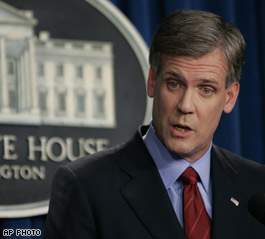FIXING THE BEEB
Martin Walker correctly diagnoses the esteemed network’s problems:
The BBC is not just a British icon, it is an international institution, and for most of its 77-year history it has been the most respected news-gathering operation in the world. And now, because of two incautious statements by a reporter awoken at 6 a.m. to go live on air by telephone, its future is in serious jeopardy, despite the revealing fact that three times more people tell British opinion polls they trust the BBC than the handful who say they trust Tony Blair’s government.
The BBC’s future as an institution is in trouble because it is not fully independent. It depends on the government continuing to support the system by which the BBC is financed. Every TV set in Britain pays a poll tax of $180 a year — whether it is tuned to the BBC or not — known as the BBC license fee. This brings in some $3 billion a year, and it funds the main BBC-TV channels, its radio networks national and local, its news and current affairs programs, its internationally celebrated drama and comedy shows and all that has made the BBC famous and respected.
But that money also pays for the fact that the BBC as a network competes with private corporations, from Rupert Murdoch’s Sky channels to Granada and Independent Television and CNN and Disney and all the other hordes of broadcasters who fill the airwaves. And to compete, to grab as many viewer eyeballs as possible, the BBC produces and buys a great deal of garbage, from second-rate Hollywood movies to the third-rate American sitcoms and fourth-rate Australian soap operas. The BBC, frankly, has far too much air time to fill, and far too much of it is filled with junk.
Now, of course, the same is true of American commerical television–including CNN, MSNBC, Fox News, and the other 24-hour networks. But no one is forced to subsidize them.
Dismantling the BBC altogether would be a terrible idea, leaving its carcass to be picked over by a scavenging Rupert Murdoch and other big private broadcasters. Forcing the BBC to try to maintain its present output through paid advertising would also be problematic, transforming the British advertising industry, cutting back the finite ad funds available for everybody — newspapers included. But there is still no reason why old-age pensioners on limited budgets should have to find $180 a year to help finance the pulp and punk TV hat fills so much of the BBC’s entertainment output.
The sensible answer would be to keep what is good about the BBC — its news and current affairs, its drama and sports, and its role as the national forum, and drop the rest. Cut BBC-TV and radio down to one channel each, plus the magnificent BBC World Service, and pay for it all through a much-reduced license fee. Simple, but probably too simple for the angry BBC reporters and bureaucrats and a Tony Blair looking for revenge.
While my libertarian instincts tell me that letting the Beeb take its chances on the free market would be exactly the right answer, I agree that it would be a shame to lose the best parts of it. And it’s unclear to me that the market would support something like the World Service, which is undeniably terrific. Indeed, the same is true of NPR and PBS here. While the tendency of all of them is to take on a leftist slant, they still offer a seriousness and depth that’s largely unavailable elsewhere. The all-news networks really aren’t all-news; they’re mainly entertainment masquerading as news with a bit of news thrown in occasionally. I’d miss NPR’s Morning Edition and BBC World Service if they weren’t around.





While I mostly agree with Mr. Walkers prescription I’m not sure I agree with the cause. If the beeb only had this one report to answer for they would not be in the hot water they are in. There problems are deeper than one sleepy reporter.
The problem with any state run media is that they are, by definition, removed from reality. I listen to the World Service on this cool little radio, but I’m not nearly as enamored of it an you. They do provide a level of depth not often found without reading but the slant can be tiresome.
—